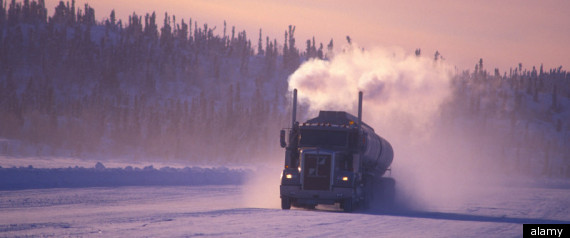 Northern Manitoba residents are desperately hoping for some cold weather, because milder than normal temperatures are leaving the opening of northern ice roads in doubt.
Northern Manitoba residents are desperately hoping for some cold weather, because milder than normal temperatures are leaving the opening of northern ice roads in doubt.Many people in remote northern communities use ice roads every winter to get groceries and other essential supplies transported by truck from urban centres like Winnipeg.
Some also drive on the roads to buy their own groceries, which they say would cost twice as much at home.
"Winter roads are a necessity with the high costs of living up north, and we all depend on the winter roads," said Irma Harper of St. Theresa Point, Man., who was buying supplies in Winnipeg on Saturday.
The seasonal roads, which are built on frozen lakes as well as land, take some time to prepare, and in a typical year are open from mid-January until March.
But above-normal temperatures across much of Manitoba so far this winter have northern residents nervous that this year's ice road season could be cut short, or the roads may not be built at all.
'Drastic' food costs
A shortened or cancelled ice road season means northerners like Harper would have to order their groceries from Winnipeg and get them flown to their communities at higher costs."It's going to be very drastic in terms of food supplies…like flour, sugar," Harper said. "If we have to ship those things up north, it would cost us lots."
The federal government also uses winter ice roads to send essential supplies — such as chemicals for water treatment plants, fuel for school buses, and even school supplies — to remote northern communities.
In 2010, the federal Aboriginal Affairs and Northern Development department spent $2.3 million to ship those supplies by air. Officials say they may have to airlift supplies again this year if temperatures don't get any colder.
"We are prepared to implement our contingency plan, which would mean having supplies airlifted in or paying for other alternative methods for getting supplies into communities," said Ellen Funk, a department spokesperson in Winnipeg.
Funk said the federal government will help subsidize food costs in northern communities.
Original Article
Source: Huff
No comments:
Post a Comment